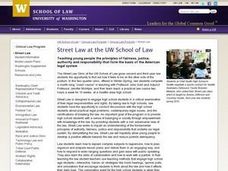Carnegie Mellon University
International Perspectives to Climate Change 2
A couple PowerPoint presentations are used to stimulate discussion about the perspectives of different countries on the issue of energy consumption. Afterward, they play a game in which each team is assigned a country, considers its...
Japan Society
Akutagawa Ryunosuke and the Taisho Modernists
Japan's Taisho Period was a time when authors like Akutagawa and other Japanese modernists began to experiment with point of view and literary form, making the literature produced during this time period a natural choice for teaching...
Science 4 Inquiry
The Impact of the Sun and Moon on Tides
In 150 BC, Seleucus of Seleucia theorized that the moon causes the tides. Scholars learn about what causes tides by studying the interactions of gravity between the sun, moon, and Earth. They use technology to formalize otherwise...
Consortium for Ocean Science Exploration and Engagement (COSEE)
Plankton to Penguins: Antarctic Food Web
A well-written lesson plan, second in a series of four, gets high schoolers exploring how the Antarctic food web is impacted by climate change and the associated melting of polar ice sheets. It begins with a PowerPoint presentation about...
Science 4 Inquiry
Deforestation
Young scientists observe deforestation from satellite photos and discuss the importance of forests to the global environment. They then simulate a plot of forest when farmers move into the area over the course of seven years. Finally,...
Science 4 Inquiry
An Investigative Look at Florida's Sinkholes
In May of 1981, the Winter Park Sinkhole in Florida first appeared and is now referred to as Lake Rose. Scholars learn about the causes of sinkholes through an inquiry project. Then, they analyze recent data and draw conclusions to...
Science 4 Inquiry
The Ups and Downs of Populations
As the reality of population decline across many species becomes real, pupils learn about the variables related to changes in populations. They complete a simulation of population changes and graph the results, then discuss limiting...
Science 4 Inquiry
The Ups and Downs of Populations
Life has its ups and downs ... especially if you're an animal! Biology scholars engage in a population study through an inquiry-based lesson. Pupils work together to explore the factors that affect deer populations, then examine the...
Curated OER
Cellular Models
Each student construct a model of a cell on a large cookie, including the parts which were discussed during lecture.? Half of the class will be instructed to make plant cell models and the other half will be in charge of animal cell...
Science 4 Inquiry
Layers of the Earth
We can't dig a hole through the Earth, so how do we know about the layers beneath our feet? Scholars learn about layering through hands-on exploration of common materials. They study the characteristics of each layer and apply their...
Science 4 Inquiry
Atmospheric Layers
Space diving refers to the act of jumping from outer space and falling through Earth's atmosphere before parachuting to land. Scholars learn about this extreme activity and study the layers of the atmosphere they must conquer in the...
Science 4 Inquiry
Temperature of Inner Planets
Mars, Earth, and Venus contain atmospheres that generate weather. Young scientists explore the temperature of inner planets. They create a model simulating the greenhouse effect before researching and answering guided questions to...
Shodor Education Foundation
Introduction to the Concept of Probability
Acquaint mathematicians to the concept of probability with a discussion about the results of a game. Then have them play a dice, card, spinner, or coin game and recording the number of wins vs. the number of tries on an interactive web...
Curated OER
Atomic Structure and Bonding
Eighth graders discuss and write about what led up to the discovery of the atom. Students label proton, nucleus, electron, and neutron in their notes. Students take notes on electron shells and how different atoms have different...
Curated OER
Making the Grade: College Level Study Skills
Students discuss their most difficult college text. They take a questionnaire that analyzes their note taking styles and skills and then identify the appropriate way to study for a college level exam.
Purdue University
Healthy Body Image: A Lesson Plan for Middle School Students
This is a very valuable lesson for middle schoolers on the importance of maintaining a healthy body image through diet, exercise, and positive mentality. The resource includes four lesson plans. The first two plans outline the physical...
Curated OER
Model lesson on Domestic Violence and Teen Dating Violence
Students define and examine the dynamics of domestic violence. They participate in two simulations, discuss song lyrics, define the role of the media, and complete a writing exercise.
Curated OER
Time Management: College Study Skills
Pupils read articles and listen to a lecture about time management. They discuss an appropriate balance between study and leisure time and identify the importance of setting a regular schedule for eating and sleeping. Students identify...
Science 4 Inquiry
The Ins and Outs of Photosynthesis
The most important chemical process on Earth is photosynthesis. Scholars explore the changes in the gases in our atmosphere as life on Earth developed. They create a model of photosynthesis and consider simple questions.
Curated OER
Cell Biology
Identify the different cell organelles in prokaryotes. Modelling the cells using Jell-o and candies will be a fun way to experience the cell in a hands-on way (different to using play-doh!). They observe cells under a microscope and draw...
Curated OER
Climate Change and Corporate Profitability
Students study green economics. In this business ethics lesson, students listen to a lecture about environmentally stable businesses and respond to discussion questions based on the lecture.
Curated OER
Kinetic Vs. Potential Energy
Eighth graders listen to a teacher lecture and observe a demonstration of both potential energy and stored energy. After discussing the characteristics and examples of different types of energy, 8th graders make predictions and then...
Science 4 Inquiry
The Yin and Yang of Photosynthesis: Day vs. Night
Floating fragments of elodea can grow even without roots. Young scientists use eldoea plants to observe the oxygen production from photosynthesis. They study the difference between having access to high amounts of light and low amounts...
Curated OER
James McCune Smith: A Model of Resistance
Learners discuss examples of resistance. In this anti-slavery instructional activity, students analyze a portrait of James McCune Smith and listen to a lecture about his life and involvement in abolition. Learners analyze his actions and...

























